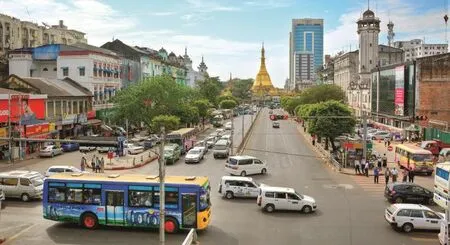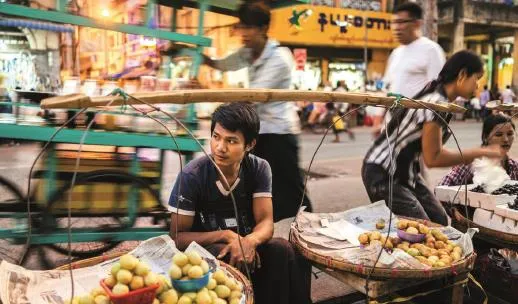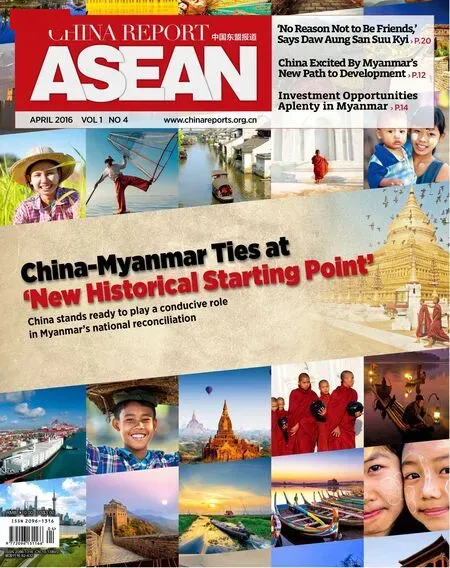My 10 Months in Peaceful Yangon
2016-09-26ByWangZhiwei
By Wang Zhiwei
My 10 Months in Peaceful Yangon
By Wang Zhiwei

Yangon, Myanmar's largest city, is a fascinating place for travelers.
The difference between traveling and studying in foreign countries does not only lie in time changes. When traveling overseas, you always try to capture the spirit of the place. However, if you go to study in a foreign country, you will live like a local and witness both the upsides and downsides of local life.
No matter whether it was the long wait at the trafc light at Hledan in the scorching heat, the sleepless nights because of power cuts, the endless onslaught of mosquitoes or the splendid Shwedagon Paya at night, they have all been deeply engraved in my memory.
I studied in Myanmar for 10 months. Afer returning home, my friends ofen asked me about my life there. When I mentioned the slow Internet speed and searing heat all year round, they would pat my shoulder and look sympathetic while sighing.
“It must have been really hard on you. You'll never go back there, will you?” they would ask.
My response was simple: “I can't wait to visit again.”
Days in Myanmar
Actually, my life in Myanmar was fairly busy. Besides attending lessons, doing homework and preparing for examinations, I had to buy food and cook for myself. My roommate and I, two slackers who knew nothing about cooking at first, turned into two reasonably competent chefs by the time we fnished our studies in Myanmar and returned home. In the early days, we couldn't cook at all. We were really afraid to step into the Hledan vegetable market full of fresh vegetables, fruit, fsh and meat. This is because we couldn't speak Myanmar language freely at that time and sometimes had to use body language. What is even worse is that there were things on sale for which I didn't know the Myanmar language equivalent and some I'd never seen before.
Fortunately, the women selling vegetables were extremely kind. Tey could always save me from embarrassment and patiently introduce the name and price of each vegetable and conversion relationship between various weights and measures. Sometimes, they even helped correct my pronunciation and grammatical mistakes. If not busy, the owner of the pork stall would tell me the specifc names of different parts of the pig and their good and bad points, as well as the best ways to cook them. In this way, I got familiar with the vendors in the market. Seeing me from a distance, they would shout hello. Thanks to them, I eventually remembered all the vegetable names and could even bargain in Myanmarlanguage. My language skills did improve a lot. These shopkeepers were my teachers. In some sense I've learned more from them than from the teachers in school.
In the vegetable market, what impressed me most is that everybody was polite and amiable, which is different from my experience at home. Te people in my hometown are famous for their hot temper. Tey ofen quarrel for minutes over just a few cents when buying vegetables in the open market. Te reason for this is usually attributed to lack of education. It seems that more education should lead to better manners. However, Myanmar taught me that this isn't true. Those women selling vegetables in the market had received little education, but they always talked in a sof voice with a smile on their face.
On this point, there was no diference between them and those teaching in universities. After staying in Myanmar for some time, I began to talk in gentle tones, just like the locals. It has even infuenced my Chinese, since returning home I speak more sofly than I did before.
City of Buddhism
In Myanmar, I had been wondering why the people there, men and women, young and old, were all so kind and friendly no matter their social status. At frst, I thought that they were polite to me because I am a student from China. Later, however, I found that the local residents also tend to treat each other with great respect. After gaining more knowledge of the local culture, I found out the reason behind it. Yangon means “wars ended” in Myanmar language, and is thus also known as the “City of Peace”. As Myanmar is a Buddhist country, the people greatly respect monks. When talking with monks, they usually use special honorifics. As I wasn't familiar with these honorifics in the early days when I got there, I didn't dare to talk with monks for fear that I might ofend them due to my improper use of words.

Street vendors selling fruits, vegetables and meats are a key part of Yangon's vibrant food scene.
Te Myanmar people are kind and friendly, which is closely related to Buddhism. A local friend once said to me that “everyone meets one another during reincarnation”, which sounds romantic and warm. As non-Buddhists, we see many strangers in the street. However, in the eyes of Buddhists in Myanmar, everybody in the street may have been encountered in a previous reincarnation and, indeed may have been your friends or even family. It seems that this theory can also help solve another puzzle. When Myanmar people talk to each other, they will call those older than them aunt, uncle, grandma or grandpa. Even those of the same generation are called brother or sister, and given names are seldom used. Tis is true not only among friends, but also among strangers. Since everybody might have met each other in previous reincarnations, they should treat other as family in the present reincarnation.
Yangon in My Eyes
With no lessons at weekends, my roommate and I often went out for dinner and then a stroll in the city center. Yangon is not as modern as Shanghai or Hong Kong, but it has its own style. Te downtown area features orderly streets, with the Sule Paya in the center. Around it are rows of Victorian buildings that give a feel of wandering in 19th-Century London. However, crazy buses in the street seem to come straight out of a 1960s movie. Walking along Mahabandoola Road from west to east, you pass through the communities featuring diverse cultures, including Chinatown full of gold stores and barbecue stands, Indian temples, Jewish markets and Muslim mosques, almost as if you are traveling in diferent countries altogether.
We usually took a bus to the downtown area, but sometimes chose a train for a diferent experience. Tere is a railway station near the Hledan Market. Yangon has no subway. Local residents prefer to take the round-thecity train if they need to travel a fairly long way. The railway was built by British settlers during the colonial era. Taking the train, you will feel it shake at times, and it runs fairly slowly. Luckily, the Myanmar people are never in a hurry no matter what they are doing. Besides “hello”, the words they most frequently use may be “Don't worry. Just take it slow.”Afer staying here for long, I've also unknowingly slowed down my pace of life, just like the people of Myanmar.
When the rainy season comes, heavy rain may hit Yangon almost every day, together with strong winds. At these moments, I ofen stayed indoors, watching the swaying branches of the coconut and mango trees through the window. Te humid wind blew away the summer heat in the room. After returning to Beijing, listening to the rain outside my window, I still can't help looking out, only to notice there are no coconut trees in sight anymore.
杂志排行
China Report Asean的其它文章
- Yangon's Golden Pagoda A Magnifcent Tribute to Buddha
- Drama Depicts Ancient China-Myanmar Friendship
- Buddhist Exchanges Key to Mutual Understanding
- Hydropower Projects Illuminate Both Sides of the Irrawaddy River
- Power Station Construction a Boon for Myanmar People
- Students on the Forefront of Friendship-Boosting Cultural Exchanges
